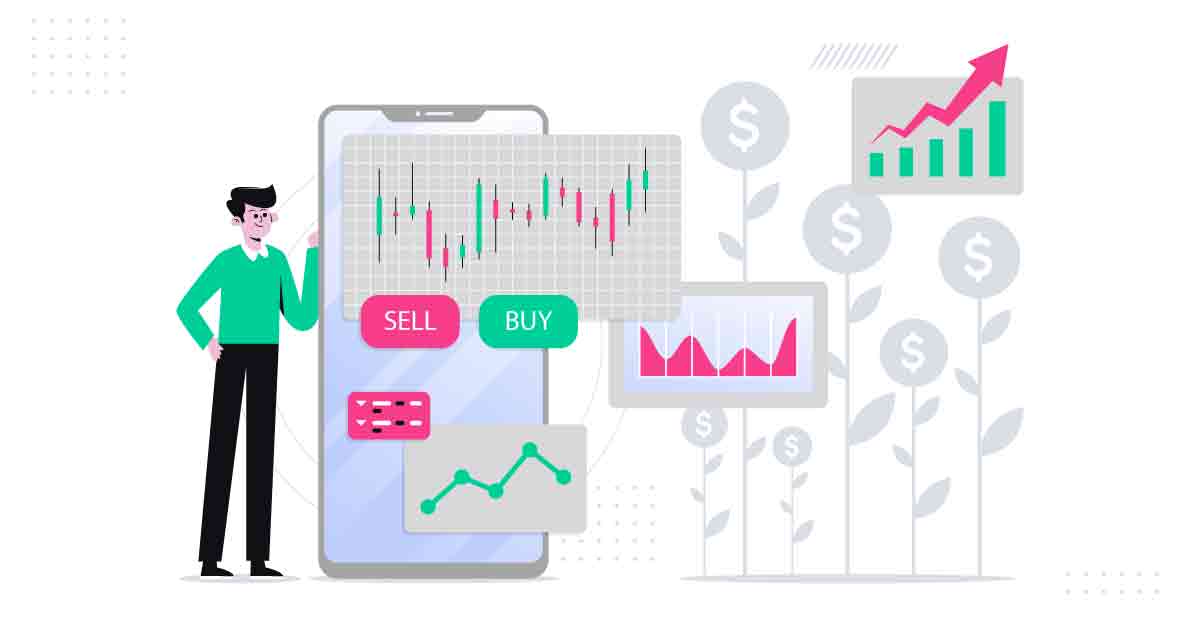Commodity exchanges are platforms where various raw materials, agricultural products, energy resources, and precious metals are traded in standardized contracts. These exchanges are pivotal in facilitating transparent and efficient trading, providing market participants with a platform to buy or sell commodities at prevailing market prices. In India, commodity exchanges have emerged as crucial institutions contributing significantly to the economy.
The role of commodity exchanges in India has significantly transformed the landscape of commodities investment. Among the notable platforms, the Multi Commodity Exchange (MCX) stands out as a pivotal player in the Indian commodities exchange arena. Through these exchanges, individuals and businesses can engage in commodity trading, involving a wide array of goods such as agricultural products, metals, energy resources, and more.
Commodity trading online has made the process more accessible, allowing participants to trade various commodities swiftly and efficiently. This convergence of technology and the stock market has opened doors for both seasoned investors and newcomers, enabling them to diversify their portfolios beyond traditional stocks.
In the dynamic commodity stock trading market stock trading market of India, these exchanges offer numerous advantages. They provide a structured platform for price discovery and risk management, which is crucial in a volatile market. Farmers, producers, and end-users can hedge against price fluctuations, ensuring stability in their operations. Additionally, commodity exchanges enhance market transparency by disseminating real-time information, enabling informed trading decisions.
The growth of commodity trading stocks has also contributed to the broader financial ecosystem of India, fostering economic development and attracting investments. In conclusion, commodity exchanges have revolutionized commodities investment in India, catalyzing economic growth and modernizing the trading landscape through platforms like MCX, thereby connecting a diverse range of participants through seamless commodity trading online.
Evolution of Commodity
Commodity trading stocks refer to the process of buying and selling shares in companies that are involved in producing, exploring, or distributing commodities. These stocks provide investors with a way to participate in the performance of particular commodities and the industries associated with them. In simpler terms, investing in commodity trading stocks allows people to invest in companies related to the production, exploration, or distribution of commodities like oil, metals, or agricultural products. The value of these stocks can be influenced by changes in commodity prices and the overall demand for the commodities and their industries.
Understanding Commodity Trading Stocks
Commodity trading stocks refer to the activity of purchasing and selling shares in companies that are directly involved in the production, exploration, or distribution of commodities. These stocks provide individuals with an opportunity to invest in businesses related to various commodities, such as metals, energy resources, agricultural products, and more.
Investing in Commodity-Related Companies:
When you invest in commodity trading stocks, you're essentially buying ownership in companies that play a significant role in the commodity industry. These companies can be mining, drilling, refining, processing, or transporting commodities.
Diversification:
Commodity trading stocks allow investors to diversify their portfolios beyond traditional stocks and bonds. This diversification can help manage risk by reducing the impact of poor performance in any single sector.
Correlation to Commodities:
The value of commodity trading stocks is often closely tied to the price movements of the underlying commodities. If the price of a particular commodity rises, it can positively impact the earnings and profitability of the related companies, potentially leading to an increase in their stock prices.
Commodities Investment in India
In recent times, India's commodities investment landscape has experienced significant growth, attracting investors who are looking to diversify their investment portfolios. Commodity investment involves putting money into physical goods such as gold, silver, and agricultural products to potentially gain from their price movements.

Diversification Opportunity:
Commodities investment allows investors to diversify their portfolios beyond traditional assets like stocks and bonds. Diversification can help reduce risk by spreading investments across different asset classes that might not move in tandem with each other.
Precious Metals (Gold and Silver):
Gold and silver are among the most popular commodities for investment in India. They are often seen as stores of value and safe-haven assets, particularly during times of economic uncertainty or inflation. Investors buy these metals not only for potential price appreciation but also as a hedge against currency devaluation.
Agricultural Commodities:
Agricultural products like grains, pulses, and edible oils have also gained traction as investment options. These commodities can be influenced by factors such as weather conditions, supply-demand dynamics, and government policies. Investing in agricultural commodities allows investors to gain exposure to the agricultural sector's performance.
Hedge Against Volatility:
Commodities investment, especially in assets like gold, can serve as a hedge against market volatility. When traditional financial markets experience downturns, commodities like gold tend to retain their value, making them appealing to investors seeking stability.
The Evolution of Multi-Commodity Exchange
The establishment of the Multi-Commodity Exchange (MCX) brought about a transformative change in India's commodity trading scene. MCX, through its adoption of an electronic trading platform, introduced efficiency, transparency, and accessibility to the commodity trading landscape, making it more inclusive and investor-friendly.
Electronic Trading Platform:
MCX shifted the traditional open outcry trading system to an electronic trading platform. This transition allowed traders and investors to buy and sell commodities using computers and the internet, eliminating the need for physical presence on the trading floor.
Efficiency and Speed:
The electronic platform of MCX streamlined the commodity trading process, reducing the time it takes to execute trades. This efficiency was especially beneficial for both institutional and retail investors, enabling quicker decision-making and execution.
Transparency:
With electronic trading, MCX introduced greater transparency to commodity trading. Real-time price information, order book visibility, and trade execution details became readily available, empowering traders and investors with accurate and timely data.
Accessibility:
The electronic platform made commodity trading more accessible to a broader range of participants, including individuals who previously might not have had direct access to commodity markets. This inclusivity democratized trading opportunities.
The Landscape of India's Commodities Exchange
India's commodities exchange is a comprehensive platform that offers a diverse range of products for trading. This includes commodities spanning energy resources, metals, agricultural goods, and more. The broad spectrum of commodities available for trading reflects India's abundant resource base and provides traders with numerous investment opportunities.
Commodity Categories:
India's commodities exchange covers various categories, such as:
Energy:
This includes commodities like crude oil and natural gas, which are crucial for energy production and consumption.
Metals:
Precious metals like gold and silver, as well as industrial metals like copper and aluminum, are traded on these platforms.
Agricultural Products:
Grains (wheat, rice), pulses (lentils, chickpeas), edible oils, spices, and other agricultural goods are actively traded.
Soft Commodities:
This category includes products like cotton, sugar, and coffee, which are grown rather than extracted or mined.
Base Metals:
Metals like zinc, lead, and nickel, which are essential for various industries, also feature on the exchange.
Investment Opportunities:
The diversity of commodities available for trading provides traders and investors with a broad array of investment options. Each commodity category has its dynamics influenced by factors such as global demand, supply conditions, geopolitical events, and weather patterns.
Risk Management:
Commodities exchanges offer risk management tools like futures and options contracts. These allow participants to hedge against price volatility, helping producers, consumers, and traders manage their exposure to price fluctuations.
Market Speculation:
Traders can engage in speculative trading, aiming to profit from short-term price movements.
Role in the Economy:
India's commodities exchange plays a crucial role in price discovery and price transparency. The exchange's pricing mechanisms reflect supply-demand dynamics and other relevant market information.
Embracing Commodity Trading Online
The advent of online trading platforms has further democratized commodity trading. Investors can now trade commodities with ease, accessing real-time data, charts, and analysis to make informed decisions.
Navigating the Commodity Stock Trading Market
Commodity stock trading involves speculating on the price movements of commodity-related companies. This market enables investors to profit from the performance of commodity-dependent businesses.
The Benefits of Commodity Exchanges
Commodity exchanges provide a range of advantages that contribute to efficient markets and cater to diverse participants. These benefits encompass essential aspects like price discovery, risk management, and liquidity provision. Participants from producers and consumers to institutional investors are drawn to these advantages:
Price Discovery:
Commodity exchanges serve as platforms where prices of various commodities are determined through the interaction of supply and demand. These transparent and real-time price levels help participants gauge the fair value of commodities, aiding informed decision-making.
Risk Management:
One of the primary benefits of commodity exchanges is the availability of risk management tools. Futures and options contracts allow participants to hedge against price fluctuations. Producers and consumers can lock in prices to ensure stable revenue or input costs, reducing exposure to market volatility.
Liquidity Provision:
Commodity exchanges foster liquidity in the market by providing a platform where buyers and sellers can easily find counterparties for their trades. This liquidity enhances the ease of trading and reduces transaction costs.
Driving Economic Growth through Commodities
India's commodity sector significantly contributes to its GDP and employment. The growth of commodity trading fosters economic development, boosts agricultural production, and supports rural livelihoods.
Challenges and Opportunities in Commodity Trading
While commodity trading presents immense potential, challenges such as market volatility, geopolitical factors, and supply chain disruptions need to be navigated. Strategic risk management is crucial.
Commodity trading offers significant opportunities, yet it comes with challenges that require adept handling. These challenges include:
Market Volatility:
Commodity prices can be highly volatile due to factors like global economic shifts, weather conditions, and geopolitical events. This volatility can lead to uncertain profit margins and investment outcomes.
Geopolitical Factors:
International relations, conflicts, and political decisions can impact commodity markets. Trade disputes, sanctions, or disruptions in key producing regions can affect supply and demand dynamics.
Supply Chain Disruptions:
Commodity trading is vulnerable to disruptions in supply chains caused by transportation issues, natural disasters, labor strikes, or regulatory changes. These disruptions can lead to sudden price fluctuations and delivery delays.
To navigate these challenges and harness the opportunities, strategic risk management is paramount. Some points to consider:
Diversification:
Spread investments across different commodities to mitigate the impact of poor performance in a specific sector. Diversification reduces overall portfolio risk.
Hedging Strategies:
Utilize futures and options contracts to hedge against price volatility. Hedging helps lock in favorable prices, safeguarding against unexpected price changes.
In-depth Research:
Thoroughly research and analyze market trends, supply-demand dynamics, and geopolitical factors affecting commodities. Informed decisions are crucial to managing risks effectively.
Real-time Monitoring:
Stay updated with real-time information through reliable sources. Rapid reactions to market changes can mitigate potential losses.
Regulatory Framework and Governance
Robust regulatory frameworks govern India's commodity exchanges, ensuring fair practices, transparency, and investor protection. Regulatory authorities play a pivotal role in maintaining market integrity.
Commodity Exchange and Price Discovery
Commodity exchanges facilitate price discovery, a process where supply and demand dynamics converge to determine the fair market price of commodities. This mechanism enhances market efficiency.
The Future of Commodity Trading in India
The future of commodity trading in India looks promising. As technology continues to advance, trading platforms will become more sophisticated, attracting a broader spectrum of investors.
Investing in India's Commodity Market: A Bright Horizon
As India's economy evolves, its commodity market offers exciting prospects for investors. Diversification, risk hedging, and the potential for substantial returns make commodity trading an appealing option.
Conclusion:
In conclusion, commodity exchanges in India have evolved into dynamic platforms that drive economic growth, facilitate investment diversification, and offer opportunities for market participants. The fusion of traditional commodities with modern trading practices has positioned India's commodity exchanges as vital contributors to the nation's financial landscape.






